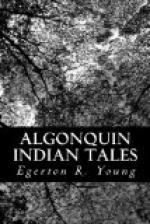“Then he proceeded to give them the terrible stings which they have had ever since, and as the wasps and hornets claimed to be their cousins Wakonda was good-natured enough to give them the same sort of weapons. Some people, especially boys, think this was a, great mistake, and would be very glad if Wakonda had refused to give stings to the yellow wasp and the black hornet.”
“Well, what happened after the bees got their stings?” said Sagastao.
“A good deal happened,” said Mary, “and that very soon. A lot of them, without as much effort to conceal their nest as formerly, selected a tall, hollow tree, and using a big knot hole as the door began secreting their honey in it. They had made the combs, and were now filling them, when along came a couple of bears. These animals, as you have been told, are great honey thieves, but they always had hard work to find where the timid bees had cunningly hid it away, and now they could hardly believe that right here before them was a great swarm of bees filling the air with their buzzing as they flew in and out of the knot hole.
“With saucy assurance they at once began climbing the tree, expecting to be able to put their long paws into that big hole and draw out the combs. But they never reached that knot hole. The noise they made in their climbing alarmed the bees. Out they came in great numbers, and now, instead of flying around in a panic, like so many house flies, and seeing their honey devoured, they at once flew at their enemies, the bears. They stung them on their noses and about their eyes and lips, and indeed in every spot where they could possibly reach them with their terrible new weapons.
“The bears could not make out what the trouble was. They howled with rage and terror, yet they were resolved to get that honey, and still tried to crawl up higher on the tree. But at length the bees mustered in such vast numbers—for those away gathering honey, as they returned, joined in the attack—that the bears became wild with pain and fear, and had to give up their effort and drop to the ground. Even then the bees gave them no peace, and continued to sting them until they were obliged to run into the dark forest for relief.
“Thus it happens now that almost all creatures that bother the bees are similarly treated.”
[Illustration: “They howled with rage and terror.”]
“Well,” said Minnehaha, “they need not have stung me because I was picking a few flowers; but, after all, I am glad they have their stings or I suppose we should never have any honey.”
“They are not big enough to have much sense,” replied Sagastao, “and so they go for everyone that gets in their way.”
Mary now carefully removed the clay poultices, which had effectually done their work. A wash followed, in the waters of the lake which rippled at their feet, and soon not the slightest trace of the sting remained. By the time they reached home both pain and tears were well-nigh forgotten.




